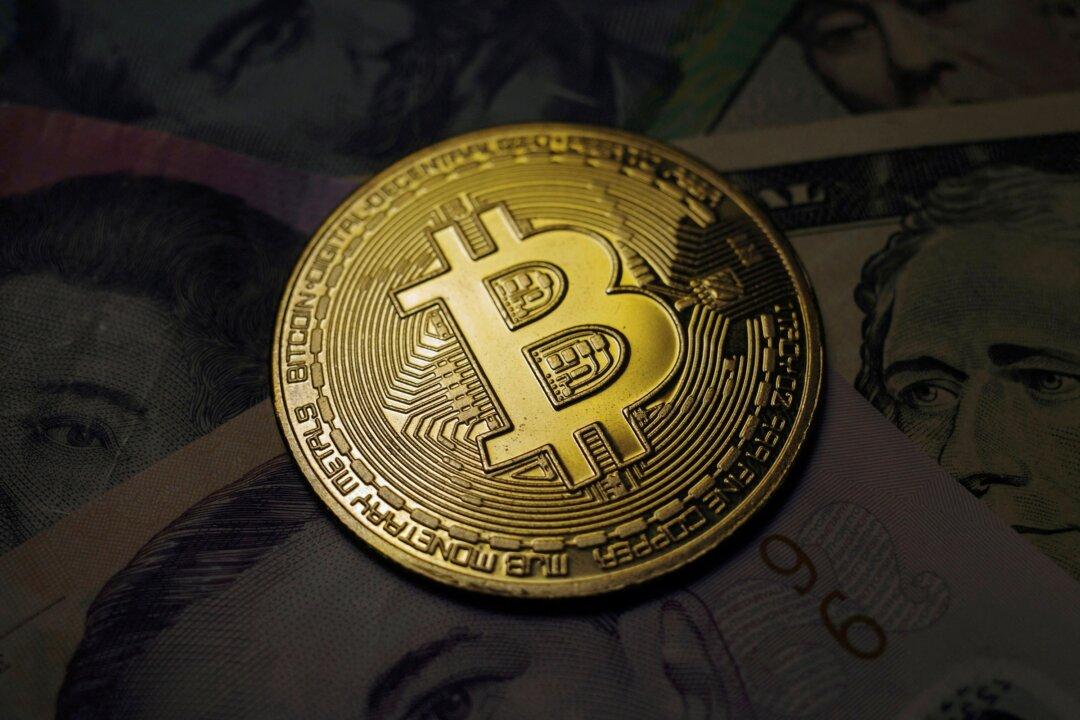Commentary
Anyone who watched television during 2022 saw the ubiquitous TV commercials for Grayscale, which manages the world biggest Bitcoin investment fund. Those ads touted Bitcoin as “the future” and should be part of a retiree’s portfolio.
But investors in Grayscale Bitcoin Trust (GBTC) are facing both a problem and an opportunity.
The problem? GBTC trades at a 46 percent discount to its underlying holdings, as of Feb. 24. This means the per-share value of the fund is 46 percent less than the Bitcoins held in the fund’s portfolio. No doubt the ongoing legal issues facing Digital Currency Group (DCG), the parent company of Grayscale, is one factor in the large discount.
The opportunity is that if the fund were to trade up to its net asset value—and that is one giant “if”—investors would realize an 84 percent gain.
Non-traded funds such as real estate investment trusts (REITs) and business-development companies pricing below asset value isn’t a new phenomenon. There can be factors such as supply and demand and quality of the underlying asset that could drive this spread. But a discount of up to 50 percent? That’s almost unheard of, and it amounts to around $7 billion of trapped value.
The simple explanation for such a wide spread is investors are concerned about challenges at DCG, a cryptocurrency conglomerate of sort. DCG is backed by none other than SoftBank, which seems to have its hand in a number of failed or failing startups. DCG owns Grayscale, crypto news media CoinDesk, Bitcoin miner Foundry, a small London-based crypto exchange named Luno, and crypto brokerage and lending giant Genesis Capital. The last company, Genesis Capital, is currently under Chapter 11 bankruptcy protection, after its lending arm blew up after last year’s crypto rout and FTX’s collapse.
DCG has been selling its stakes in various investment vehicles run by Grayscale, according to regulatory filings. Despite GBTC and its Ether-focused fund trading below their asset values, DCG presumably has needed to raise cash by all means necessary to support Genesis during bankruptcy. The Financial Times also reported that DCG retained investment bank Lazard to explore a sale of CoinDesk.
A competitor has also targeted Grayscale. Osprey Funds, which also runs several crypto-focused investment funds, sued Grayscale in January for putting out misleading marketing statements to gain market share.
“Grayscale has made materially false and misleading statements in its advertising and promotion … that turning its Bitcoin asset management services into access to a Bitcoin ETF was a foregone conclusion, when it knew that access was never likely to happen,” the complaint, filed in the Connecticut Superior Court, alleges.
Clearly, these financial and competitive difficulties at parent company DCG is not lost on GBTC investors which contribute to the giant discount.
Let’s examine the last point in the Osprey complaint, as it’s an important factor in GBTC trading below its fair value.
GBTC is not an exchange-traded fund (ETF). It also holds actual Bitcoins. There are Bitcoin-focused ETFs, such as the ProShares Bitcoin Strategy Fund, but all of them invest in Bitcoin futures, not Bitcoin itself. Futures are regulated by the Commodities and Futures Trading Commission (CFTC) in the United States.
Grayscale (and many other asset managers) has tried to convert its GBTC fund to an ETF for years, without success. The U.S. Securities and Exchange Commission (SEC) has rejected every single application so far. The SEC argues that, unlike futures, the spot Bitcoin is unregulated and the market is ripe with manipulation and potential fraud.
To Grayscale, the best way to eliminate this massive discount is to convert to an ETF. And it sued the SEC to force its hand, with oral arguments set to begin in Washington, D.C., in early March. If successful, it may be a pathway to unlock the approximate $7 billion.
In the meantime, institutional and activist investors are circling Grayscale.
One group of investors, called RedeemGBTC, wants the fund manager to reduce its 2 percent management fee, which is calculated on the underlying Bitcoin holdings, not the discounted share price, which inflates the fees earned by Grayscale.
Hedge Fund Fir Tree filed a lawsuit against Grayscale in December alleging mismanagement and severe conflicts of interest. The fund believes that Grayscale and DCG have very little incentive to act in the best interest of investors because they are earning lucrative fees that aren’t affected by the discount to fair value.
Will the $7 billion of value ever be unlocked and returned to shareholders? Or will Grayscale be remembered as another high-profile failed crypto venture?





